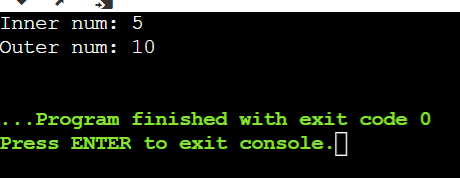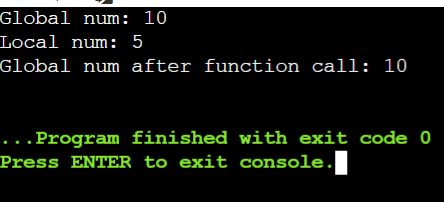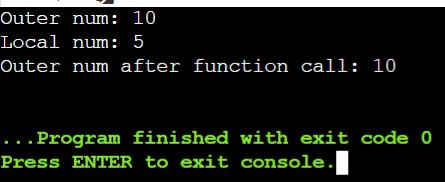Variable Shadowing in C++In this article, we will discuss the Variable Shadowing in C++ with its type, examples, and uses. What is Variable Shadowing?Variable shadowing is a programming language notion that occurs when a variable inside a given scope hides or overshadows another variable with the same name from a broader scope. This event might cause confusion, unexpected behavior, and coding flaws if not handled correctly. Understanding the Variable Shadowing:Variable shadowing occurs in C++ when a newly defined variable, usually within a nested scope (such as a function or a block), shares the same identifier as a variable in an outer scope. As a result, the variable in the inner scope obscures or conceals the variable in the outer scope. Example:Let us take an example to illustrate the variable shadowing in C++. Output: 
Explanation: In this example, the variable num inside the if block, in this case, shadows the num variable defined in the outer scope. The inner num will be used within the block, while the outer num will be left alone. Effect on Program Execution:During program execution, variable shadowing can cause confusion and unforeseen consequences. When developers mistakenly shadow variables, it can lead to unexpected behaviour, particularly if the inner variable is changed under the idea that it relates to the outer variable. Furthermore, debugging becomes difficult because it is not always clear which variable is being referenced within a certain scope. In large programs, this uncertainty might grow, increasing the likelihood of logical mistakes and defects. Global Variable Shadowing:
Example: Let us take an example to illustrate the Global Variable Shadowing in C++. Output: 
Explanation:
Local Variable Shadowing:
Example: Let us take an example to illustrate the Local Variable Shadowing in C++. Output: 
Explanation:
Handling Variable Shadowing Algorithm:Consider implementing the following algorithmic procedures to alleviate variable shadowing issues in C++: Avoid Shadowing: Use distinct names for variables in various scopes to avoid unintended shadowing. Use descriptive names to improve code readability and reduce the likelihood of conflicts. Enable Warnings: Enabling compiler warnings can assist in identifying probable instances of variable shadowing. Use compiler settings (for example, -Wall for GCC or Clang) to enable variable shadowing warnings, assisting in proactive identification during compilation. Static Analysis Tools: Static code analysis techniques can be used to detect and highlight occurrences of variable shadowing. Tools such as Clang Static Analyzer and cppcheck can help discover shadowed variables in a program. Best Practices for Dealing with Variable Shadowing:There are several best practices for dealing with Variable Shadowing. Some main best practices are as follows: Use Meaningful Variable Names: Use descriptive and distinctive variable names to limit the possibility of unintended shadowing. Limit Variable Scope: When possible, keep variable scope to a minimum. Declare variables in the smallest possible scope to avoid unintended shadowing. Be Mindful of Nested Scopes: When utilizing nested scopes, use caution when reusing variable names to avoid inadvertent shadowing. Enable Compiler Warnings: Use compiler settings to enable variable shadowing warnings and address them proactively. Conclusion:Variable shadowing in C++ can complicate, code maintenance, and debugging. Developers can alleviate these issues and produce more robust, maintainable, and bug-free code by understanding its ramifications and applying best practices. Variable shadowing in C++ requires awareness, careful design, and adherence to best practices. Understanding variable shadowing's impact and applying measures to reduce its occurrence are critical steps towards designing more efficient and maintainable C++ programs.
Next TopicDifference between cerr and clog in C++
|
 For Videos Join Our Youtube Channel: Join Now
For Videos Join Our Youtube Channel: Join Now
Feedback
- Send your Feedback to [email protected]
Help Others, Please Share









